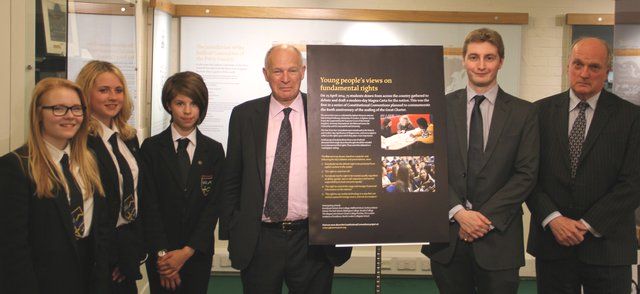Winning Clauses
The winning clauses were placed on display in the Supreme Court include:
- Everyone has the default right to be protected from explicit content in the media
- The right to vote from 16
- Everybody has the right to be treated equally regardless of ability, gender, race or self-expression and has the responsibility to treat everyone equally
- The right to control the usage and storage of personal information on the internet
- The right to use nuclear technology in a way that can used as a peaceful energy source, not as a weapon
Lord Neuberger, President of the Supreme Court | “Unveiling” of Magna Carta Constitutional Convention exhibition panel | Tuesday 22 July 2014, UK Supreme Court
Thank you for coming this evening to celebrate the success of the inaugural Magna Carta Constitutional Convention. The young people here today represent the 75 or so students who gathered at Royal Holloway on 25 April to learn more about Magna Carta and to debate their own clauses for a modern day Bill of Rights.
The clauses identified by these students represent a very interesting snapshot of the concerns of young people today and many of them have a strong resonance. For instance, I see they called for enfranchisement of 16 years-olds, which brings to mind the Scottish referendum. They also called for better protection from explicit media content, which will strike a chord with many anxious parents. They also called for investment in nuclear energy, and, whether one agrees with that or not, it strongly suggests sophistication and independent thought.
These issues were not matters which would have worried the Barons, let alone King John, in 1215, when there were no votes, no media and no nuclear energy. The barons were more concerned about taxes, property and imprisonment without trial – not unfamiliar issues today. And, if we stand back a bit, the topics explored in April are of fundamental and timeless importance, and apply today just as much as they did at the time the great charter was sealed at Runnymede almost 800 years ago – questions about how we respect each other’s privacy and possessions; and about how we secure equality of status before the law for all. Some things never change. Striving to secure fundamental rights and the rule of law – the idea that no-one is beyond the power of the law – is a perpetual endeavour. As someone once said: “the price of liberty is eternal vigilance”. That is a principle of particular relevance in 21st century UK where, after 950 years without a successful invasion, and 350 years without a revolution or any tyranny, we are in serious danger of becoming much too complacent.
That is the most important reason I am so pleased to welcome you here this evening. Encouraging and empowering debate about Magna Carta encourages us to think about its modern-day impact, but, perhaps more importantly, to think more widely about the rule of law, the proper balance of powers within the state, and the basic rights and responsibilities we should expect for and from everyone today. Projects which inspire a passion within new and future generations of guardians of the rule of law should be warmly welcomed and encouraged – so that I am very happy to do this evening.
Before I pull the cord and we have a drink to celebrate, I do want to say a special word of thanks. We are all indebted to the work of Egham Museum, and particularly Matthew Smith, for all the hard work that has gone into this project. Thank you Matthew.
And I now declare this exhibition panel unveiled.

